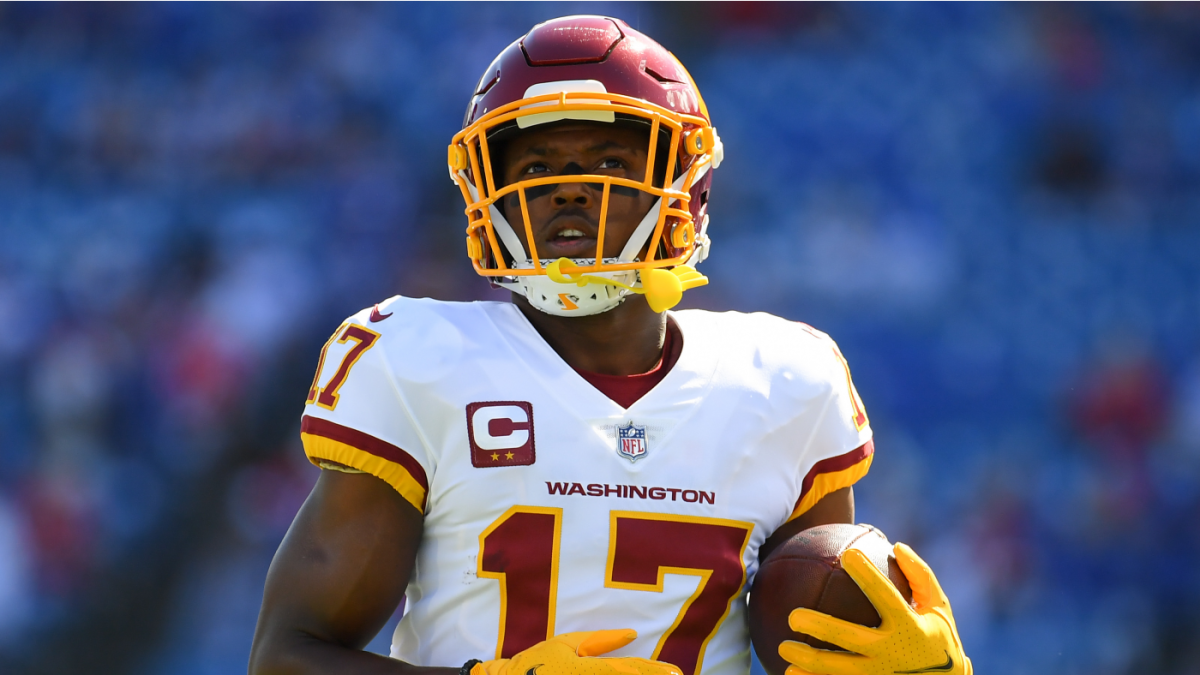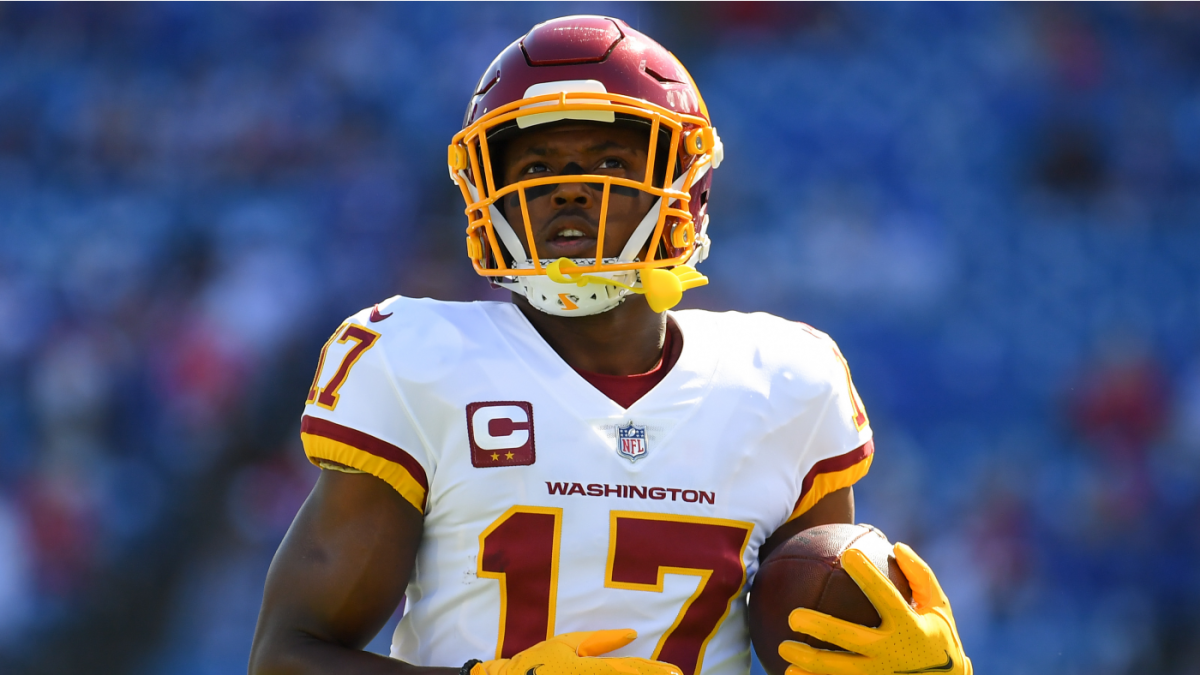The Terry McLaurin Impasse: A Crossroads for Player and Franchise
The NFL landscape is never short of drama, but few stories capture the essence of modern football’s complexities quite like the Terry McLaurin impasse. As the Washington Commanders’ star wide receiver enters the 2025 offseason, he finds himself at a career crossroads, with contract negotiations stalled and a trade request hanging in the balance. This situation isn’t just about one player’s future—it’s a microcosm of the NFL’s economic realities, the power dynamics between players and franchises, and the delicate balance between short-term success and long-term vision.
The Contractual Stalemate: When Value and Vision Collide
At the heart of this impasse lies a fundamental disagreement over value. McLaurin, a two-time Pro Bowler with five consecutive 1,000-yard seasons, is seeking a contract that reflects his status among the league’s elite receivers. Reports suggest he’s aiming for a deal exceeding $30 million per year, placing him among the highest-paid players at his position. The Commanders, however, are taking a more cautious approach, weighing McLaurin’s worth against their broader financial strategy and long-term goals.
This isn’t just about the numbers on a contract. It’s about the philosophy of building a franchise. The Commanders, under General Manager Adam Peters, appear to be prioritizing financial flexibility and long-term sustainability. They’re likely considering the salary cap implications of locking in a star receiver for the next several years, especially in an era where the NFL’s economic model favors teams that can maintain cap flexibility.
McLaurin, on the other hand, is playing a high-stakes game of his own. By requesting a trade, he’s not just expressing his dissatisfaction—he’s applying pressure. This move forces the Commanders to either meet his demands or explore trade options, potentially giving him a say in his next destination. It’s a calculated risk, one that could pay off handsomely if he lands with a contender or a team willing to meet his financial expectations.
The Case for McLaurin: More Than Just Numbers
To understand why this situation is so contentious, it’s essential to recognize what McLaurin brings to the table. He’s not just a productive receiver—he’s a leader, a workhorse, and a player who has thrived despite inconsistent quarterback play and offensive schemes. In an era where elite wide receiver play is a prerequisite for success, McLaurin represents a proven commodity capable of elevating any offense.
His consistency is particularly noteworthy. In a league where injuries and inconsistency plague even the best players, McLaurin has been a steady force. He’s the kind of player who can change the trajectory of a franchise, and that’s not something teams can easily replace. The question for the Commanders is whether they’re willing to invest in that consistency or if they’d rather use the assets they could acquire in a trade to build a new core.
The Trade Market: A Landscape of Possibilities
If the Commanders decide to trade McLaurin, they’ll have no shortage of suitors. Several teams could benefit from adding a player of his caliber, and the competition for his services could drive up his trade value. Here are some of the most likely destinations:
Los Angeles Chargers: A Match Made in West Coast Heaven
The Chargers are often mentioned as a potential landing spot for McLaurin, and for good reason. With Justin Herbert at quarterback, the Chargers have a young, talented signal-caller in need of a reliable target. McLaurin’s speed and route-running would complement Herbert’s strengths, and the Chargers have the cap space and draft capital to make a competitive offer.
New Orleans Saints: A Veteran Presence in the Big Easy
The Saints are always looking to add pieces that can help them contend in the NFC South. McLaurin’s experience and consistency would be valuable assets for a team that has shown it can win with a balanced offense. The Saints have the financial flexibility to make a move, and pairing McLaurin with a quarterback like Derek Carr or a rookie could be a game-changer.
Indianapolis Colts: A Fresh Start with Familiar Faces
The Colts are an intriguing option for McLaurin. With a young quarterback in place and a need for offensive firepower, the Colts could offer McLaurin a fresh start in a less pressured environment. The Commanders’ front office might also be open to a trade with the Colts, given their history of making competitive offers for star players.
New York Jets: A Quarterback’s Best Friend
The Jets are desperate to provide their quarterback with reliable targets, and McLaurin would be an immediate upgrade. The Jets have the draft capital to make a significant offer, and the prospect of playing in a high-profile market like New York could be appealing to McLaurin.
Las Vegas Raiders: A Desert Dream?
The Raiders are always looking to make a splash, and acquiring McLaurin would certainly generate excitement. However, the Raiders’ financial situation and long-term vision might make them a less likely destination. Still, in a league where perception is everything, the Raiders could be a dark horse in the McLaurin sweepstakes.
The Commanders’ Dilemma: Rebuild or Retain?
The Commanders find themselves at a critical juncture. They must decide whether to retain McLaurin by meeting his contract demands or trade him for valuable assets to aid their rebuild. Several factors will influence their decision:
- Financial Flexibility: Can the Commanders afford to pay McLaurin what he’s asking for while addressing other roster needs? The salary cap is a zero-sum game, and every dollar spent on one player is a dollar that can’t be spent elsewhere.
- Long-Term Vision: Does McLaurin fit into the team’s long-term plans? Are they confident they can build a winning team around him? The Commanders’ front office has emphasized the importance of building a sustainable winning culture, and their approach to the McLaurin situation will provide insight into their overall strategy.
- Trade Market: What is the potential return they could receive in a trade? Would the assets acquired be more valuable than retaining McLaurin? The Commanders will need to weigh the immediate impact of losing McLaurin against the long-term benefits of a strong trade return.
The Injury Factor: A Wild Card in the Equation
Adding a layer of complexity to the situation is McLaurin’s recent injury update. While the details of the injury are not fully clear, any health concerns could impact his trade value and the Commanders’ willingness to commit to a long-term contract. Injuries are an inherent risk in the NFL, and teams will factor that into their decision-making process.
Conclusion: A Defining Moment for Player and Franchise
The Terry McLaurin saga is more than just a contract dispute—it’s a defining moment for both the player and the Washington Commanders. McLaurin is seeking to secure his financial future and play for a team that values his contributions. The Commanders must decide whether to invest in a proven star or prioritize long-term rebuilding through the draft.
The outcome of this situation will have significant implications for the team’s trajectory and McLaurin’s career. For McLaurin, it’s an opportunity to secure his financial future and play for a team that values his contributions. For the Commanders, it’s a chance to shape their franchise’s future, whether by retaining a star player or acquiring the assets needed to build a contender.
In the end, this situation is a reminder of the NFL’s ever-evolving landscape. It’s a game of chess, where every move has consequences, and the stakes are higher than ever. The Terry McLaurin impasse is a microcosm of that reality, a story that will continue to unfold in the coming months and years.












